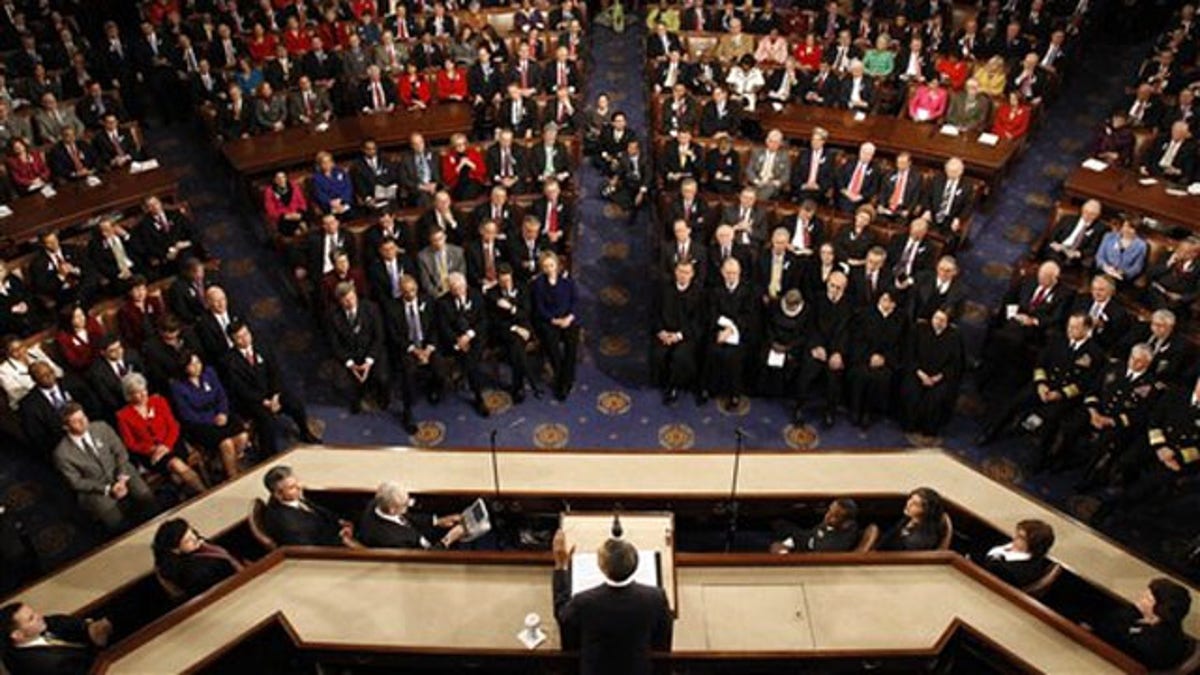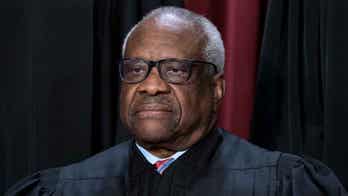
President Obama delivers his State of the Union address at the Capitol in Washington Jan. 25. (AP)
President Obama's pledge to freeze some federal spending for five years was met with yawns Wednesday from a slew of fiscally minded Republicans who say that if the president is serious about tackling the national debt, he'll have to do a lot better than that.
Congressional Republicans want to see deep cuts in the budget, as demonstrated by a GOP proposal last week to slash $2.5 trillion over the next decade and a proposal Tuesday from Sen. Rand Paul, R-Ky., to cut $500 billion in one year.
Their calls to dismantle entire agencies and departments might not get much bipartisan support. But by comparison, the president's call to freeze domestic spending for five years, yielding a projected savings of $400 billion over a decade, looked too tame to many lawmakers.
"We're continuing to spend at a deficit level, so if we do that for the next five years, we'll continue to add to our debt," Rep. Kristi Noem, R-S.D., told Fox News. "The reality of his speech last night is very difficult to imagine."
Sen. John McCain, R-Ariz., said spending has to at least revert back to 2008 levels, if not 2006 levels.
For context, the $400 billion Obama says he'd save over the next decade, presuming his freeze goes into effect, amounts to one-third of the budget deficit for 2010 alone.
He also called for cuts to the biggest slice of the federal budget pie, entitlement spending. He said costs for Medicare and Medicaid must be reduced, expressing a willingness to look at GOP-touted medical malpractice reform to help bring down health care costs. And he called for a "bipartisan solution" for Social Security, but he did not offer specifics and coupled that call with a warning to spare current retirees, not slash benefits for future retirees and avoid privatized plans.
He called for a ban on earmarks, which doesn't necessarily change the amount of money being spent by federal departments. Plus Obama urged Congress to let the recently approved tax-cut extension expire for the wealthiest Americans in two years, teeing up a fight with Republicans in the middle of the 2012 campaign season.
But Republicans, and some Democrats, who are uneasy about taking a vote in the coming months to lift the debt ceiling above $14.3 trillion, want to see deeper cuts proposed. Obama declared at the end of his State of the Union address, "We do big things." Many lawmakers want that mantra applied to deficit reduction.
Sen. Jeff Sessions, R-Ala., ranking member on the Senate Budget Committee, complained that Obama's road map didn't so much address deficit reduction as "deficit preservation."
"We need leadership and vision from the president," he said in a statement. "But tonight we saw timidity and denial."
Some lawmakers complained that Obama seemed to offer more proposals for new spending than spending cuts.
The president set several long-term benchmarks in his speech, raising the possibility that new spending would be needed to accomplish them. Obama called for providing 80 percent of Americans with high-speed rail access in 25 years; he called for 98 percent of Americans to be covered by high-speed wireless in five years; he called for 1 million electric vehicles on the road by 2015; and he called for 80 percent of the country's electricity to come from clean-energy sources by 2035. He highlighted the latter as a target of government investment in the years to come, saying the budget he'll soon send down to Congress will include money for biomedical research, clean-energy technology and other projects.
On education, Obama proposed making a $10,000 tuition tax credit permanent.
And in a nod to Republicans, the president also proposed lowering the corporate tax rate, while simplifying the tax system and getting rid of loopholes, a change he pledged would be deficit-neutral.
Republicans praised the president for the corporate tax pitch and for the overall tone of the speech, but questioned how the math could possibly result in a balanced budget.
"The president's 'spending freeze,' which apparently includes holding a handful of government programs at already high funding levels while increasing spending elsewhere, simply goes beyond what our nation's pocketbook can support," House Appropriations Committee Chairman Rep. Hal Rogers, R-Ky., said in a statement.
Rep. Paul Ryan, R-Wis., who delivered the Republican response to Obama, focused his address on the threat posed by the rising national debt and the need to reduce it.
"We hold to a couple of simple convictions. Endless borrowing is not a strategy. Spending cuts have to come first," he said. "Our nation is approaching a tipping point."
But Democrats are trying to cast Ryan, the brain behind his party's debt reduction pitch, as a disingenuous messenger.
The Democratic National Committee Tuesday night sent out an e-mail claiming Ryan's budget plan would "worsen the deficit," citing a study last summer from the Center on Budget and Policy Priorities. Plus the DNC hammered him for voting for the deficit-spending budgets under the administration of former President George W. Bush.




